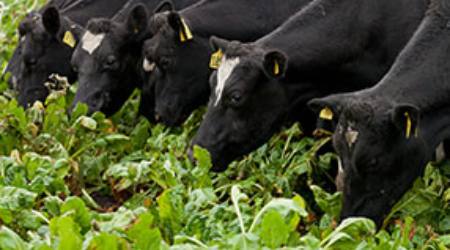Flippin' Great Results
Eric & Margaret Smeith
Fast Facts
Dairy farm: Galatea area:164 ha, includes 20 ha run-off, flat land
Herd: 390 predominantly Jersey
Pasture: Ryegrass, free draining, dry soil – Kaharoa sand on top of Taupo pumice
Analysis: Soil and herbage tests every couple of years
Feed strategy: Pasture, palm kernel (for early spring period), maize silage; Cropping – fodder beet (3.4 ha) and maize (4.4 ha) on flipped land, lucerne (20 ha); SealesWinslow fodder beet block
Results: 134,000 kg milk solids, milking cows in excellent health through winter cropping thanks to mineral supplementation.
Flippin’ Great Results
An interest in the volcanic history of the Galatea area had dairy farmer Eric Smeith dig deep – that is, all the way into ancient fertile soils. In the process he developed a soil flipping technique which paved the way for a great start to fodder beet cropping. Combined with SealesWinslow fodder beet blocks it is a recipe for success.
Farming conditions can be tricky in the small Bay of Plenty settlement of Galatea where Margaret and Eric Smeith run their attractive 164 hectare dairy property with 390 jersey milking cows. The very hot summers are especially problematic given the local pumice soils. They dry out quickly in the 30°C+ days that are far from uncommon in the region.
“We can go from having excess rain to actually wanting rain within two short weeks,” says Eric. It’s easy to see why they have 84 hectares covered by irrigation, fed by water from the Whirinaki River.
Eric grew up on the farm which the couple later purchased from Eric’s parents in 1982. Since then it has been improved and extended; there was the addition of 57 hectares of dryland across the road and recently also a 20-hectare lucerne cropping block.
The perhaps most noteworthy improvement started in 2001 with an experiment that raised the odd eyebrow among local farmers and various interest groups. Having noticed the different soil layers, including a thick layer of the loose ash left behind by volcanic eruptions 5000 years ago, Eric reasoned that its composition might offer better water retention properties than the current top layer. This hypothesis was further supported by his observation that pasture was generally much greener where soil had been dug up for water pipes, power lines or the like.
Putting thought into practice, he turned over a paddock to a depth of 1.8 metres. The results were encouraging. “The new soil absorbs the moisture really well and has much better water holding capacity,” says Eric. His experiment was followed by a three-year DairyNZ funded study. It indeed confirmed that soil flipping gives pasture species a better chance of survival.
Eric was chuffed with the results. “We grew 40% more dry matter within 12 months so the payback is actually quite quick,” he explains.
He has used the flipped paddocks for cropping and says they’re always “guaranteed good crops”. In fact, the very first flipped paddock still stays green and lush throughout summer. There’s no doubt in his mind that the soil flipping was a critical success factor for a strong start with fodder beet cropping. “We achieved 25 tons per hectare in the second year and believe there’s potential to increase it to 35 tons provided we get everything right,” he says. The biggest beet last year weighed in at 18.5 kg.
However, fodder beet also meant there was a need to supplement phosphorus. “The first year we bought dicalcic phosphate, mixed it into a slurry and poured over the bales in the paddock. But we found it too labour intensive,” he notes. Next season they opted for SealesWinslow fodder beet blocks and think it is the perfect solution. “We’ve found them really good. The blocks are easy to handle, and the cows didn’t take long to get a taste for it. It’s a well-balanced mineral mix… The animals came through really well and without any health issues.”
All up the experience with the product has been overwhelmingly positive and he looks forward to continuing with it in future seasons. Much like with his soil flipping programme which has plenty of work for the digger yet!


